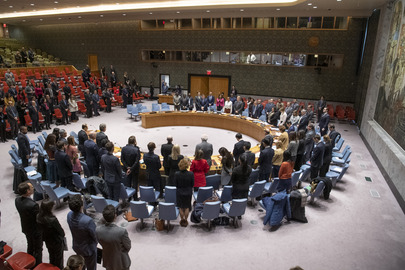In July alone, nearly 12,000 children under five were identified as acutely malnourished out of 136,000 screened, according to aid partners.
Of these, more than 2,500 were found to suffer from severe acute malnutrition, the most life-threatening form, and 40 had to be hospitalized in stabilisation centres.
More children affected
The proportion of children with severe acute malnutrition is rising, OCHA said.
In June and July, 18 per cent of all acutely malnourished children had severe acute malnutrition, compared with 12 per cent between March and May.
Moreover, humanitarian access constraints are adding to the crisis.
Last month, aid partners were only able to reach 8,700 of the 290,000 children under five who require feeding and nutrition supplements due to the severe shortage of lipid-based nutrient supplements entering Gaza.
OCHA said the development “marks a dramatic collapse in the malnutrition prevention programme”, noting that an average of 76,000 children – or a quarter of those in need – were reached each month between April and June.
Distribution of other key nutrition supplies has also declined sharply, which is affecting children, pregnant women and breastfeeding mothers.
Shelter crisis worsens
Meanwhile, no shelter materials have entered Gaza since 2 March.
At the same time, more than one million shelter items, and 2.3 million items such as tents, tarps, and sealing-off materials, have been procured and are currently stuck in Jordan and Egypt as the Israeli authorities have not approved their entry.
The shelter crisis continues to worsen, with most families living in severely overcrowded and unsafe conditions. Some have no shelter at all.
In July, humanitarians assessed 44 displacement sites, discovering that 43 had families with no shelter.
A family rests after evacuating from Deir Al-Balah in the Gaza Strip. (file)
Bombardment and displacement continue
The situation is further deteriorating due to ongoing bombardment, displacement orders and insecurity, which continue to displace families and disrupt humanitarian operations.
OCHA reported that overall, realities on the ground remain largely the same since Israel announced a “tactical pause” in military operations to allow the safe passage of aid.
The UN agency reiterated that supplies that have entered remain insufficient given the immense needs, while UN convoys continue to face challenges in delivering aid.
Aid missions taking hours
While fewer humanitarian movements have been denied outright, missions that are approved still take hours to complete, with some taking more than 18 hours.
On Wednesday, five out of 11 missions requiring coordination with the Israel authorities were facilitated. These included collecting food from the Kerem Shalom and Zikim crossings.
Another four missions were impeded but eventually fully completed, which included the collection of fuel from Kerem Shalom crossing and transfer of fuel from southern Gaza to the north.
Medical evacuation update
One of the missions saw the medical evacuation of 15 children to Jordan, and 42 companions, with support from the World Health Organization (WHO). However, more than 14,800 patients in Gaza still urgently need specialized medical care.
OCHA also reported on the flow of commercial goods into the Strip, noting that several trucks carrying food items have been entering over the past days.
While the UN will continue to monitor the situation, humanitarians again stressed the need for unimpeded and predictable humanitarian access into and within Gaza, warning that “without it, time and resources are wasted, lives are lost, and the response cannot match the scale of the needs.”
Source of original article: United Nations (news.un.org). Photo credit: UN. The content of this article does not necessarily reflect the views or opinion of Global Diaspora News (www.globaldiasporanews.com).
To submit your press release: (https://www.globaldiasporanews.com/pr).
To advertise on Global Diaspora News: (www.globaldiasporanews.com/ads).
Sign up to Global Diaspora News newsletter (https://www.globaldiasporanews.com/newsletter/) to start receiving updates and opportunities directly in your email inbox for free.



























